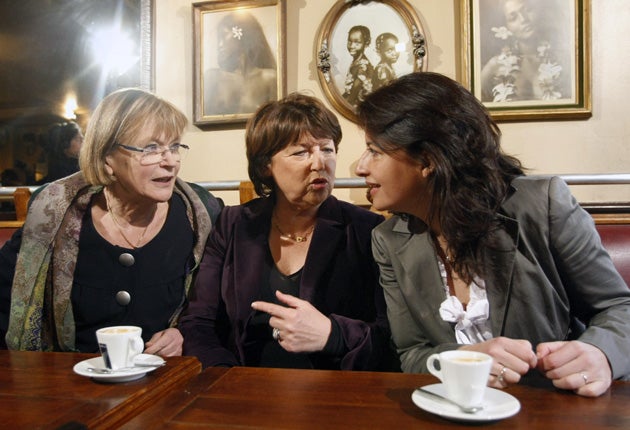World Focus: Ladies of the left spell trouble for Sarkozy's re-election bid

Your support helps us to tell the story
From reproductive rights to climate change to Big Tech, The Independent is on the ground when the story is developing. Whether it's investigating the financials of Elon Musk's pro-Trump PAC or producing our latest documentary, 'The A Word', which shines a light on the American women fighting for reproductive rights, we know how important it is to parse out the facts from the messaging.
At such a critical moment in US history, we need reporters on the ground. Your donation allows us to keep sending journalists to speak to both sides of the story.
The Independent is trusted by Americans across the entire political spectrum. And unlike many other quality news outlets, we choose not to lock Americans out of our reporting and analysis with paywalls. We believe quality journalism should be available to everyone, paid for by those who can afford it.
Your support makes all the difference.A resurgent left, and the rapid growth of the Greens, look certain to condemn President Nicolas Sarkozy to two years' hard labour when French regional elections are completed this weekend. Opinion polls suggest that an alliance of the Socialists, the Greens and the harder left is likely to sweep at least 21 of the 22 regions in Metropolitan France after the second round of voting tomorrow.
Despite the low turnout, last Sunday's first round suggests France has undergone a severe electoral earth tremor, if not an earthquake. Jean-Marie Le Pen's far-right National Front has regained some ground, but far more threatening to President Sarkozy may be the recovery of the left.
The Socialists, the Greens and two somewhat harder-left parties scored 49.9 per cent of the vote last Sunday – the highest score for the left in an equivalent nationwide poll for more than half a century.
The vote changes many of the calculations for the next presidential election in 2012. For the first time since the collapse of the Communist vote in France, the combined left appears to have the electoral ammunition to enter a presidential race with confidence.
All that the left lacks is a credible presidential contender. There has been serious talk this week of a combined left and Green presidential primary next year to pick a single candidate. This would be a revolution in French politics but, given the dispiriting list of likely runners and riders, it would not necessarily produce a "French Blair" or a "French Obama".
The Socialist leader, Martine Aubry, is given much credit for rebuilding her party but may lack the charisma to run successfully for the presidency. Some French journalists have started comparing her to the German Chancellor, Angela Merkel, but Ms Aubry is no Merkel and France is not Germany.
All the same, the resurgence of the centre-left, dismissed as moribund a year ago, has produced deep depression, and recriminations, within President Sarkozy's centre-right: its total vote last Sunday – just over 27 per cent – was the lowest in any poll since the Fifth Republic was founded in 1958.
Mr Sarkozy, and his close aides and allies, have refused to accept that this is the President's fault.
Senior figures in his own party, the Union pour un Mouvement Populaire (UMP), say the poor score can only partly be explained by the global recession. They say Mr Sarkozy has paid the price for his erratic reforms, his veering between statist and liberal attitudes, and his monarchical approach to issues such as the aborted promotion of his 23-year-old son, Jean, to a senior political post.
They also complain that Mr Sarkozy has made two serious electoral miscalculations. He has absorbed part of the old French political centre, and part of the harder right, under his own banner. And his political appointments have reached out to the left.
Far from broadening his electoral base to an unassailable size, as intended, Mr Sarkozy suddenly finds he has no electoral allies outside his own party. He has managed to offend part of his core vote and reduce the centre-right to its lowest level in half a century.
Less than a year ago, Mr Sarkozy was regarded, within his own camp, as invincible. Many grumbling voices have been heard this week. Senator Philippe Dallier, said that the President's policies had become "unreadable". Claude Goasguen, a UMP deputy on the economically liberal right of the party, said that the President's "ouverture" to left-wing appointments and his lurches into statism had "done us terrible harm".
Jean-Marie Le Pen's score last Sunday – nearly 21 per cent in Provence – has also embarrassed Mr Sarkozy. The President appeared to have ended the far-right threat by reducing Mr Le Pen's share to 10.4 per cent in the first round of the 2007 presidential election.
Nationwide, though, the NF scored only 11.5 per cent, compared with 14.7 and 15 per cent in the last two regional elections of 2004 and 1998. With the 81-year-old Mr Le Pen expected to retire next year, and the party divided and underfunded, the chances of a far-right resurgence are slight.
Join our commenting forum
Join thought-provoking conversations, follow other Independent readers and see their replies
Comments